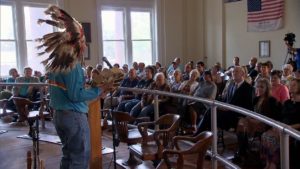A Student’s Case for a New Day at Catholic University
 An Indigenous Peoples' Day ceremony in Stanford, KY (Image via PBS)
An Indigenous Peoples' Day ceremony in Stanford, KY (Image via PBS) At the Catholic University of America in Washington, DC, thousands of students, faculty, and staff receive a three-day weekend in honor of Columbus Day. The public holiday commemorates the landing of Italian explorer Christopher Columbus in the Americas more than five hundred years ago, in 1492. Designated as a federal holiday by President Franklin Delano Roosevelt in 1937 after heavy lobbying by the Knights of Columbus, the holiday has also been used throughout modern history to celebrate and spotlight Italian American pride and heritage.
The first Columbus Day celebration took place more than two hundred years ago, in 1792, when New York’s Columbian Order (also known as Tammany Hall) held festivities to commemorate the 300th anniversary of the Niña, the Pinta, and the Santa Maria arriving in the New World in the Caribbean Sea. In 1892, President Benjamin Harrison issued an official proclamation encouraging Americans to celebrate the 400th anniversary of Columbus’s voyage. As more immigrants from Italy and their Native descendants gained prominence within the population between the nineteenth and twentieth centuries, they celebrated Columbus’s journey as well. As a current undergraduate student in my last year at Catholic University, I am surprised and frustrated that the modern church under the leadership of Pope Francis (the first Latin American pontiff), as well as a modern university with more women and non-white people of color enrolled than previous generations, continues to celebrate and honor an early-modern European explorer such as Columbus, whose expeditions and discoveries in the New World included stealing away natural resources from the Native peoples, brutally raping and murdering them, and taking others back to Europe as enslaved persons. Columbus’s discoveries would later become a primary motivator of European colonialism and imperialism over the once-rich and growing indigenous tribes and civilizations of the entire Americas.
The Catholic University of America is not the only religious institution of higher education that recognizes, observes, or celebrates the holiday on its official calendars; the Jesuit Georgetown University and the women’s Trinity Washington University do the same. However, as student diversity and awareness of social and historical issues grow, so do the replacements of Columbus Day with Indigenous People’s Day. Universities across the country, including Brown, Yale, Cornell, University of California Los Angeles, University of Nevada Las Vegas, Brandeis, and Vanderbilt, have all made efforts in recent years to either officially replace Columbus Day with Indigenous People’s Day on their own university calendars or semi-unofficially celebrate it throughout various Native peoples’ advocacy groups or causes on campus.
Not only have there been no efforts at all to replace Columbus Day with Indigenous People’s Day at The Catholic University of America, Pope Francis and the university have continued to endorse the destruction of Native communities. When the pope visited near the university in 2015 as part of his US tour, he took part in the canonization ceremony of Spanish-Californian missionary Junípero Serra at the Basilica of the National Shrine of the Immaculate Conception.
Under his authority as a clerical founder of several missions throughout California and Mexico, Serra was heavily responsible for the destruction of the Native peoples’ culture in the region, as they were forced to discard their own languages, clothing, spiritual religions, food, and other cultural customs, not to mention their premature deaths in the thousands due mostly to exposure to European diseases such as measles, influenza, chicken pox, yellow fever, scarlet fever, and bubonic plague. Forced to be converted and baptized by the church missionaries, the Native peoples were not permitted to leave the missions, and those who did escape were rounded up by Spanish soldiers and returned to the missions.
As humanists, we must not only fight for the official recognition and the observance of holidays that celebrate the indigenous peoples of various countries around the world and in the US by our civic and academic institutions, we must also call out the brutal pasts and contradictions of organized religious institutions. The Catholic Church is not alone when comes to deep historical roots in racism and colonialism against Native peoples. Muslim empires predominantly from the Middle East in the African continent were major contributors and benefactors of the Arab slave trade that caused such immense trauma, suffering, and inequalities amongst native Black populations. In 2016, the Mormon Church in Utah was legally sued by a group of Native Americans who were unwilling participants in a church-led Indian Student Placement Program, which functioned from the late 1940s to the mid-1990s. There have been at least three sexual-abuse lawsuits filed in local court as a direct result of the program.
Many religious leaders and their organizations claim that their mission is to help all people find faith and belief in something beyond their current conception of reality. In the real world, various religious sectarian groups have been complicit in the near decimation of multiple indigenous peoples around the world by almost destroying their cultures and societies through enslavement and forced conversions.
When it comes to colleges or universities like mine, an institution built on indigenous peoples’ lands, Catholic University’s administration should seriously consider renaming the second Monday in October to recognize Indigenous People’s Day.
